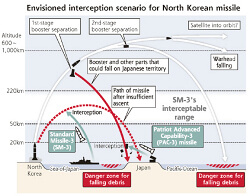South Korea having trouble funding North Korean defectors
This article in the Mainichi reports that the flow of refugees across the northern DPRK border has slowed. The reason? Much of it is financed by organizations in prosperous South Korea, but the world economic slowdown is making funding scarce. The blurb says:
The number of dappokusha fleeing from North Korea to China has decreased substantially. Yanbian Korean Autonomous Prefecture, Jilin Province, China, which abuts the PRC-DPRK border. It’s the biggest stronghold of the refugee business, but the activities of the brokers who maneuver behind the scenes guiding refugees through are at a standstill. This year is the sixtieth anniversary of the establishment of diplomatic relations between the two countries, and in addition to a heightened level of alert at the border, the effects of the financial crisis have stopped the money that gets to them from South Korea. However, the defections supported by the brokers are a “necessary evil.” Beyond the border, there’s a backlog of desperate people.
The article itself is of the punchy human-interest type, relating information about a particular broker:
The man is a former member of the PRC armed forces. His role is to move dappokusha who’ve crossed the Tuman River to a hideout in an apartment building in Yanbian. According to the man, there are (1) a border-crossing team, which works with collaborators on the DPRK side and guides [refugees] through the border crossing; (2) the man’s conveyance team; (3) the hideout-management team; (4) the long-distance-conveyance team, [to move people further] to Beijing and elsewhere. When dappokusha succeed in defecting to South Korea, suitable remuneration [in the form of] processing fees is largely provided by a support organization there in the ROK.
The situation on the ROK side is a major reason defection has decreased. It’s figured that “processing fees paid to Chinese brokers run an average of 100000 yuan (approx.1.4 million yen),” according to [a source] affiliated with a support organization. The man’s client is a South Korean religious group; donations from organizations and individuals were an effective source of capital, but “the Korean economy has cooled off, and donations have dropped of dramatically, so the flow of money is poor,” he added.
1.4 million yen is about $14000.
